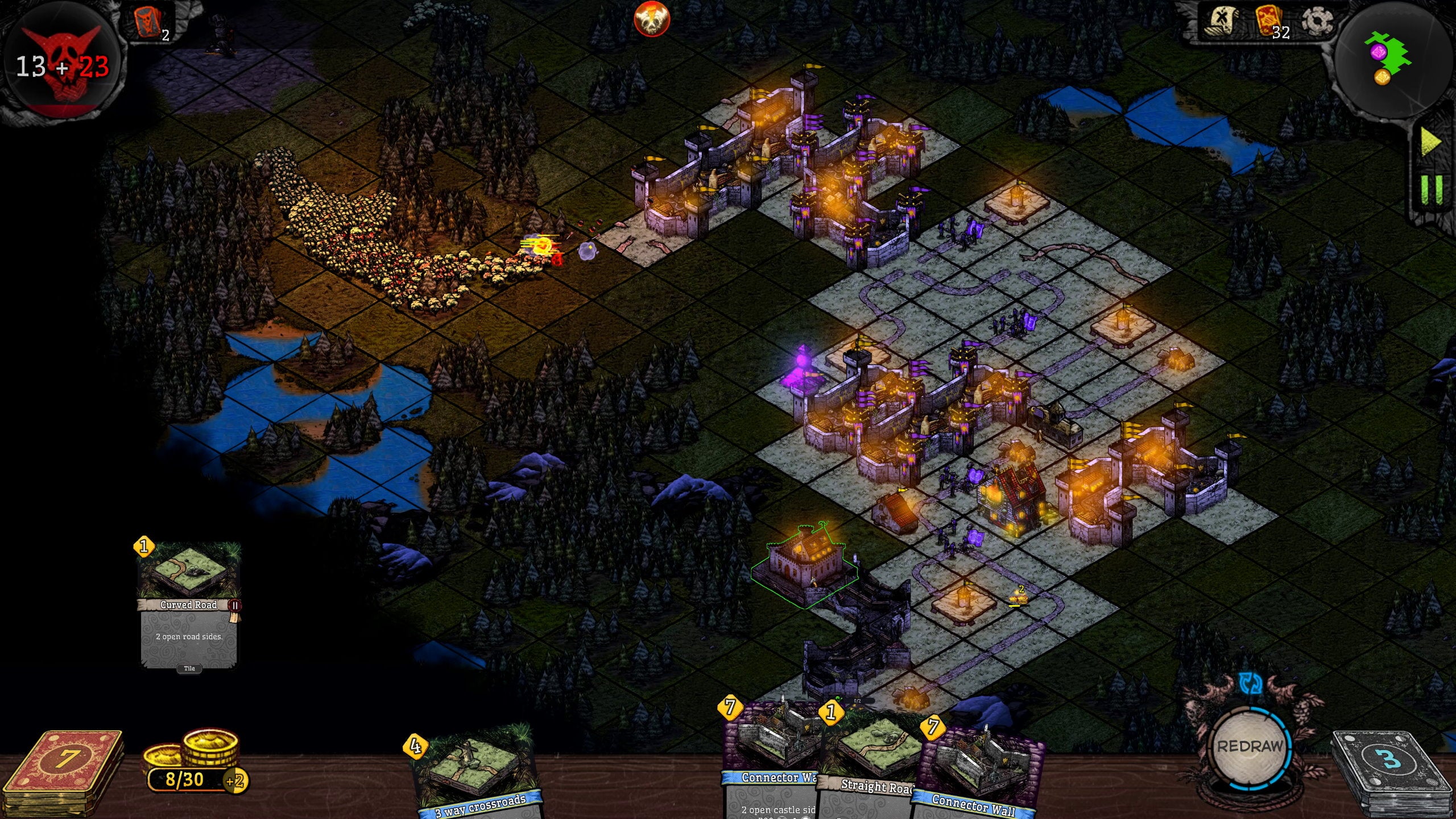Like Age Of Darkness, Diplomacy and almost every other RTS citybuilder before it, each level begins with the camera pulled in right up close on your central keep – the beating heart of your town that must be protected at all costs. If the keep falls, it’s game over. Pretty standard stuff, then, but what sets ORX apart is the random chaos of its ‘build-by-card-tile’ approach. Roads, farms, villages and castle walls must all be laid down one tile at a time on its map of isometric squares, and they’ve all got to be touching a card you’ve put down previously, too. This means towns can take on pretty wild shapes during the course of a run, with castle walls jutting out all over the shop as you hastily slap down diagonal walls next to a connector wing there, a single wall there, maybe throwing in a sharpshooter tower in the middle there somewhere, before sealing it all up and watching your castle spring up in all its powerful, misshapen glory. You see, until those wall gaps are all plugged and filled, your defences are non-existent. Simple four-wall castles can come together pretty quickly, but their meagre size means they won’t have a lot of HP to withstand the incoming orc hordes. Provided you don’t close it in with surrounding roads, you can always expand them outwards with more walls later on to increase their size and bank of HP, but it’s risky when you’ve got so many compass points to defend. Orcs will invade from any angle, and while icons on the map will give you a rough idea of where they’ll be coming from, it’s all a constant battle of quality versus quantity. Do you take your time building a giant, weird mega castle whose can stop orc hordes in their tracks, or do you just go for lots of small mini forts and hope for the best? A lot of it comes down to the cards you’re dealt, of course, but cor is it thrilling. The other thing governing each run is the health of your treasury. You bank a single gold coin every two seconds in ORX, but the key to filling your coffers quickly is by building (and closing) road networks and placing down farms and villages. These will add ‘delayed gold’ to the mix, turning that gentle tick of one gold every two seconds to two, three, or maybe even five for short periods of time. These are vital when the hordes strike, as a sudden burst of extra gold can be all you need to lay down that costly 10 gold attack buff, or add that 7 gold poison turret upgrade to your biggest and most deadly fortification. If those cards don’t materialise, though, that two-second drip can suddenly feel like 2000 years. You do have a limited number of redraws at your disposal, I should point out, just in case you can’t lay down any type of card, but trust me, they’re really for emergencies only. The great thing, though, is that ORX doesn’t just shine during its timer-driven orc raids. It remains compelling even during your moments of downtime as, while the bulk of your attention will always be pointed at defending your all-important keep, there are also vaults scattered around the edges of the map to tempt you out further. These vaults hold hidden extra cards you can add to your deck by completing certain requirements – surviving a set number of waves, for example, or finishing a certain number of roads – but neither the vault nor the quests will open up until you’ve place a card down next to it. There are ways of getting new cards and upgrading your favourites between runs, but completing vault quests will add them to your deck there and then, occasionally providing an all-important mid-game boost to an ailing run. They’re well worth seeking out, but maximising your tile grid to get there is another fun part of the strategic puzzle. If all that wasn’t enough, your hunger for gold and orc blood will also increase your ‘corruption’ bar at the end of each level, with your green foes forcing an increasing number of orc spells and curse cards into your deck to work against you. Playing these cards will make the orc waves harder to beat (which is where a sneaky redraw can sometimes come in handy), but sometimes you’ll find yourself playing it anyway just to get the card that’s coming next. It all makes for a thriving, feverish mix of real-time strategy chaos, and I’ve ended up falling into that ‘just one more go’ loop more times than I can count this week. If that sounds like your cup of green tea, then you, too, can try ORX for free right now over on Steam. The new demo is pretty sizeable – I’ve played it for several hours this week and haven’t managed to conquer the final boss yet – so it should give you a pretty good idea of what’s to come when it launches in full later this year.
